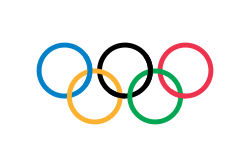Top Qs
Timeline
Chat
Perspective
Refugee Olympic Team at the 2020 Summer Olympics
Refugee team in the summer Olympics From Wikipedia, the free encyclopedia
Remove ads
The IOC Refugee Olympic Team competed at the 2020 Summer Olympics in Tokyo, Japan as independent Olympic participants.
A total of 29 athletes including 19 men and 10 women from 11 different nations competed in 12 different sports including athletics, badminton, boxing, canoeing, cycling, judo, karate, shooting, swimming, taekwondo, weightlifting and wrestling. The team included refugees from Afghanistan, Cameroon, the Republic of the Congo, the Democratic Republic of the Congo, Eritrea, Iran, Iraq, South Sudan, Sudan, Syria and Venezuela.
Remove ads
Background
The IOC code is the French acronym "EOR", which stands for Équipe olympique des réfugiés.[1] This was the second appearance of a refugee team in the summer Olympics, following the 2016 Summer Olympics.[2]
For the 2020 Games, the team included 29 athletes, up from 10 in the 2016 team. The team comprised athletes originating from 11 nations who currently reside and train across 13 host nations, supported by the IOC's Olympic Scholarships for Refugee Athletes program.[3]
At the parade of nations, the IOC Team, according to the Japanese script traditional order and English pronunciation Ai Ō Shī of IOC in Japanese, was the second to parade after Greece who traditionally parade first.[4]
Remove ads
Team selection
Summarize
Perspective
The team was selected on 8 June 2021.[1][5]
Remove ads
Competitors
In total, 29 refugee athletes competed at the 2020 Summer Olympics in Tokyo, Japan.[2]
Athletics
In total seven refugee athletes took part in the athletics events.[2]
- Track & road events
- Men
- Women
Remove ads
Badminton
In total one refugee athlete took part in the badminton events.[2]
Aram Mahmoud competed in the men's singles event after he received an invitation from the IOC.[6]
Remove ads
Boxing
In total two refugee athletes took part in the boxing events.[2]
- Key
- RSC = Referee stopped contest
Remove ads
Canoeing
In total one refugee athlete took part in the canoeing events.[2]
Cycling
In total two refugee athletes took part in the cycling events.[2]
Judo
Summarize
Perspective

In total six refugee athletes took part in the judo events.[2]
- Mixed
Karate
In total two refugee athletes took part in the karate events.[2]
- Kumite
- Kata
Remove ads
Shooting
In total one refugee athlete took part in the shooting events.[2]
Swimming

In total two refugee athletes took part in the swimming events.[2]
Taekwondo

In total three refugee athletes took part in the taekwondo events.[2]
Weightlifting
In total one refugee athlete took part in the weightlifting events.[2]
Wrestling
Summarize
Perspective
In total one refugee athlete took part in the wrestling events.[2]
Key:
- VT (ranking points: 5–0 or 0–5) – Victory by fall.
- VB (ranking points: 5–0 or 0–5) – Victory by injury (VF for forfeit, VA for withdrawal or disqualification)
- PP (ranking points: 3–1 or 1–3) – Decision by points – the loser with technical points.
- PO (ranking points: 3–0 or 0–3) – Decision by points – the loser without technical points.
- ST (ranking points: 4–0 or 0–4) – Great superiority – the loser without technical points and a margin of victory of at least 8 (Greco-Roman) or 10 (freestyle) points.
- SP (ranking points: 4–1 or 1–4) – Technical superiority – the loser with technical points and a margin of victory of at least 8 (Greco-Roman) or 10 (freestyle) points.
- Greco-Roman
See also
References
Wikiwand - on
Seamless Wikipedia browsing. On steroids.
Remove ads

